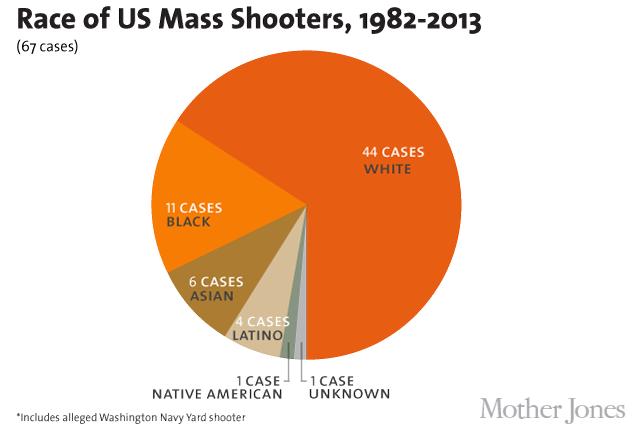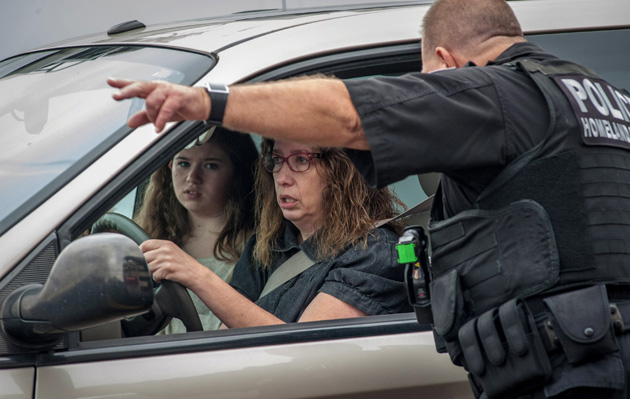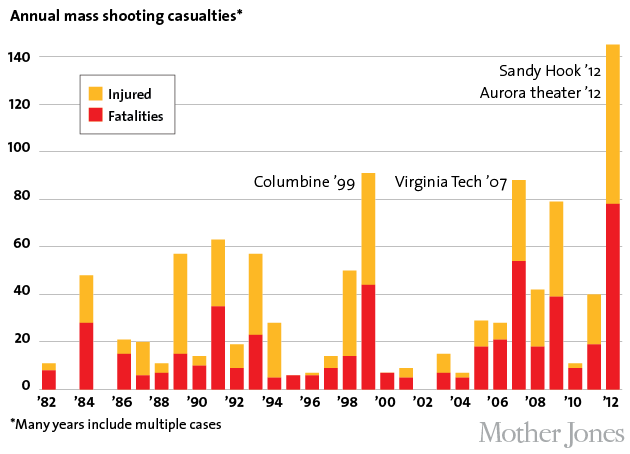At a press conference following Monday’s mass shooting at the Washington Navy Yard, Dr. Janis Orlowski, chief medical officer of Medstar Washington Hospital Center, offered some candid and heartfelt words: “I would like you to put my trauma center out of business. I really would. I would like to not be an expert on gunshots… Let’s get rid of this. This is not America.”
Unfortunately, this is America. Over the last few years there has been a pronounced rise in mass shootings, as our award–winning data investigation shows. The horror reached new heights not long ago: From a Colorado movie theater to a Connecticut elementary school, 2012 was a record year for what law enforcement refers to as “active shooter events” in public places, seven of which qualified for mass murder by the FBI’s definition. In terms of frequency this year is not far behind: There have now been five mass shootings in 2013, with more than 40 people injured and killed, from Santa Monica to Miami to to our nation’s capital. And without a quick response by law enforcement at a Florida university, or the heroics of Antoinette Tuff—an elementary school employee in Atlanta armed only with intelligence and courage against a gunman—there may well have been seven to date.
At Mother Jones, we’ve tracked mass shootings closely, analyzing 67 cases going back three decades. On Monday night, CNN’s Piers Morgan shared some of the data we’ve gathered—all of which is available to the public here—with several gun-rights enthusiasts. They didn’t seem to think much of it. Watch the heated exchange:
It’s not surprising that a discredited pundit like John Lott shows little regard for data. (That’s why Morgan keeps having him on; it makes for entertaining television.) But the reality of the nation’s gun-violence epidemic is getting harder and harder to dismiss, with new research from two different criminologists affirming that mass shootings have spiked. A report from Dr. Frederic Lemieux of George Washington University, presented at an international conference in July, found that “the frequency of this type of incident has accelerated in the past five years.” Dr. Pete Blair of Texas State University reached the same conclusion, as I detailed in this story in April.
And let’s not start up again with the NRA myth of arming “good guys” as a solution: As Blair observed in his research, not a single one of these attacks was stopped by an armed civilian. The carnage that took place in Washington, DC, on Monday was no exception. There the gunman died in a shootout with police—the second of two ways most mass shootings end (the first being when the perpetrator ends his own life with a gun.)
In the coming days, as more details emerge about Monday’s slaughter, some gun-rights advocates will no doubt continue to ignore the reality of mass gun violence. After all, it’s inconvenient for the $11.7 billion a year gun business. (Even when it actually increases demand.) But if we are to take Dr. Orlowski’s words to heart and set about getting rid of this problem, we need to recognize how often these killings occur, who’s carrying them out, and where the legally obtained, high-powered weapons used in them come from.
















